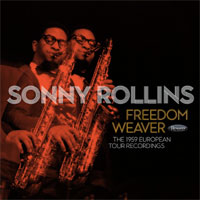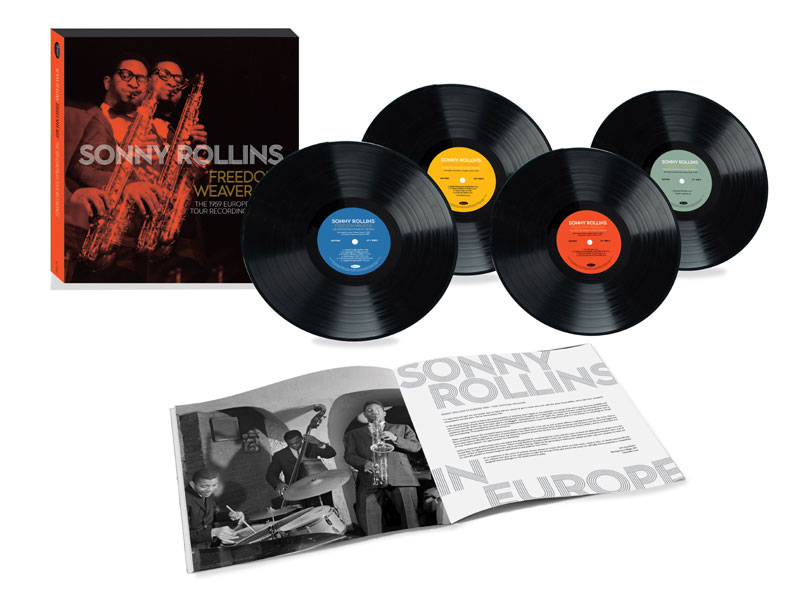Sonny Rollins • Freedom Weaver: The 1959 European Tour Recordings
 often begin music reviews with some background on the subject,
but how does one do that in a way that doesn't seem perfunctory or trite with a figure
like Sonny Rollins? Rollins, who is 94, has had a seven-decade career spanning dozens of
historic recordings. He toured for more than sixty years, playing shows with varying
lineups all over the world. He blazed his own trail, never succumbing to musical fashion.
He is more than an important tenor saxophonist; he is a monumental jazz artist and
cultural figure, a fashion unto himself. often begin music reviews with some background on the subject,
but how does one do that in a way that doesn't seem perfunctory or trite with a figure
like Sonny Rollins? Rollins, who is 94, has had a seven-decade career spanning dozens of
historic recordings. He toured for more than sixty years, playing shows with varying
lineups all over the world. He blazed his own trail, never succumbing to musical fashion.
He is more than an important tenor saxophonist; he is a monumental jazz artist and
cultural figure, a fashion unto himself.
That is now; it was different then, in 1959, when the music of Freedom Weaver was recorded. Rollins was a headliner of the first rank, but there was so much still to come. Way Out West, Saxophone Colossus and Tenor Madness were behind him, with recordings on RCA, Impulse!, Concord and others in the future. Among my favorites of these are The Bridge, Now's The Time, East Broadway Rundown, Sonny Rollins Plus 3, and Global Warming, but you can honestly buy anything from Rollins and come away with an appreciation for his towering technique and sure-footed artistry. As the title suggests, Freedom Weaver captures shows on Rollins's 1959 European tour -- music recorded at shows in Germany, France, Sweden, Switzerland, and Holland. His great musical innovation is the sax trio, with bass and drums, which he debuted in 1957 for Way Out West. Rollins favored this lineup in order to avoid the melodic and harmonic push-pull when a pianist or guitarist was part of his ensemble. It's all trio throughout the various shows captured on Freedom Weaver, with Henry Grimes playing bass, and Pete La Roca, Kenny Clarke or Joe Harris on drums. This puts Rollins's playing -- muscular, supple, fiery, heart-felt, raucous, gentle -- on full display. The set opens with "St. Thomas," Rollins's best-known number and the closest he had to a hit. The mono version from Saxophone Colossus is an audiophile staple for its chugging rhythm and forceful sound. The playing on Freedom Weaver is looser, with some rough edges that impart a sense of spontaneity missing from the tighter studio version. It's quite a way to begin the set, and what follows are other Rollins originals as well as numbers he played on other records. These include "It Could Happen to You" (The Sound of Sonny) and "Paul's Pal" (Tenor Madness). These hew more closely to the studio versions until they don't. There are two versions of the bouncy "I've Told Ev'ry Little Star" (Sonny Rollins and the Contemporary Leaders), and the Rollins-to-Rollins interplay of the first is appropriately playful, with Rollins turning away from the microphone at points to pull it off. The set from Hot Club d'Aix in Provence covers three sides with just three cuts. What makes live jazz so exciting is the right-nowness of any one performance, and that is evident in spades on Freedom Weaver. I wondered, as I listened to these performances, what Rollins thinks of his playing from well over half a century ago. Is it Man, I really had it going or Man, I'd really like a redo? I can't answer this question, but the sheer bulk of the high-level music-making on Freedom Weaver, along with the historical weight of the era from which it comes, make me wonder how a great artist views his own art decades after its creation. Rollins approved the release of this music, so maybe that's the answer.
The concerts on Freedom Weaver existed as bootlegs, but this is their first official release. Resonance Records has done it right, with Bernie Grundman doing the mastering from the existing tapes, and the LPs pressed on 180-gram vinyl at Le Vinylist in Quebec City, Canada. This care is evident in the vivid, up-front sound that is consistent across the various dates. The booklet is one of the most comprehensive I've yet seen, featuring notes by jazz critic Bob Blumenthal, and interviews with Rollins, Branford Marsalis, Joe Lovano, James Carter, and others, along with period photos. Everything is housed in a handsome box. While 2500 copies of Freedom Weaver were released in April for Record Store Day, it's still available at or near its $100 list price. Rollins ceased playing live in 2017. This makes the two
and a half hours of live music on Freedom Weaver all the more precious, but it is
not the only release by Rollins this year. The Notebooks of Sonny Rollins was
published over the summer, and it covers the period beginning after the tour Freedom
Weaver documents, when Rollins famously withdrew from touring and practiced on
Williamsburg Bridge. Freedom Weaver shows Sonny Rollins before that tumult, in
his early prime. He also had prime middle and late periods in his very long career, which
speaks not only to how prolific he was but also his ability to reinvent his music. |

